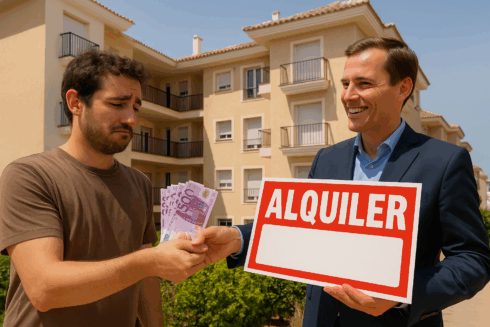SPAIN’S cabinet approved entrance of the Ley de Vivienda (Housing Law) into parliamentary debate with ministers hoping to make new measures permanent within months.
Plans drafted up by the leftwing Unidas Podemos party promise sweeping reforms that will change the face of Spain’s property market.
And Unidas Podemos minister for social rights, Iona Belarra is adamant to pass the draft bill into law ‘in tact’.
At the centre of the Ley de Vivienda is a control on rental prices, taxes paid on uninhabited houses, aid for under-35s, and tax incentives for landlords who step in line.
The law has already received harsh criticism from Spain’s General Council of the Judiciary (CGPJ) as in ‘interferes’ with regional devolved powers.
Spain’s National Confederation of Construction Companies (CNC) criticised that plans would ‘chase away’ foreign investment in Spain.
Market analysts have also called rental payments to under-35s ineffective in Spain’s bigger cities.
Here are five key aspects about to undergo scrutiny in Spain’s national Congress and Senate.
Housing tax (IBI) on uninhabited homes
Empty homes will see higher housing tax (IBI) should the Ley de Vivienda become law.
The submitted text includes plans to increase the IBI 150% on houses that have been empty more than two years.
Higher taxes will also hit anyone with more than four houses in one municipality.
Furthermore, new housing laws seek to make the arduous process of evictions in Spain even tougher, with judges deciding over cases of vulnerable families who haven’t paid rent.
Rent control in ‘tense’ areas
A key feature of the Ley de Vivienda in Spain will tackle rental prices in ‘tense’ areas.
Such areas will be defined where rental prices exceed 30% of a tenant’s income or areas in which rents have increased 5% above inflation (IPC).
The mechanism will leave town halls to decide which areas to define as ‘tense’ for a minimum of three years.
Areas will undergo a review of rental prices after 18 months, before deciding whether to prolong the designation.
Bonuses and tax incentives for landlords in ‘tense’ areas
Landlords in any ‘tense’ area will be able to claim up to 90% back from their personal income tax (IRPF) if they abide by new rules.
These rules are understood to include reducing rental prices by 5% on the previous tear.
Anyone renting out to first-time renters aged 18-35 will enjoy up to 70% back from their IRPF.
If a landlord makes renovations that improve energy efficiency, they can get up to 60% off their IRPF.
There will be no price freezes on contracts beyond 10 years in ‘tense’ areas allowing landlords to increase prices 10% if a contract is extended.
Renters will enjoy the option to extend a contract for a maximum of three years under the same conditions.
Social housing development
Spain’s government also plans to capture 30% of newbuilds as ‘protected houses’ for reduced ‘social renting’.
To make sure developers don’t lose out, the government could offer payments, land contracts or 30% extensions to projects in motion.
Rent support for young adults
One flagship policy in Spain’s new housing law is the ‘bono joven’ to encourage under 35s to leave home.
This measure was already approved earlier in January and promises a €250 a month bonus for anyone under the age of 35 (who has a salary below €24,318) renting an apartment.
Recent studies show Spain has one of the highest shares of young people living with parents in Europe – as many as 55% of 25-29 year-olds in 2020.
The move has seen criticism as rules would limit payments to apartments with a maximum monthly rental price of €600.
According to a study by Fotocasa only 1.4% of housing in Madrid fell below the €600 threshold, and in Barcelona just 0.8%.
READ MORE:
- EXPLAINED: The laws you need to know about squatters in Spain and how to evict ‘okupas’
- Spain introduces new rent benefit to encourage under-35s to leave home
Click here to read more News from The Olive Press.








